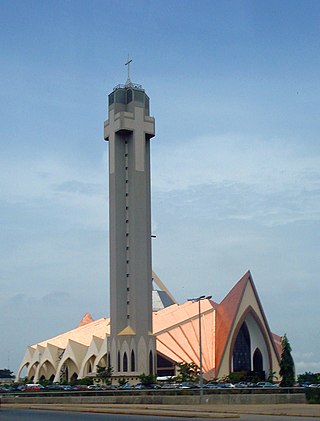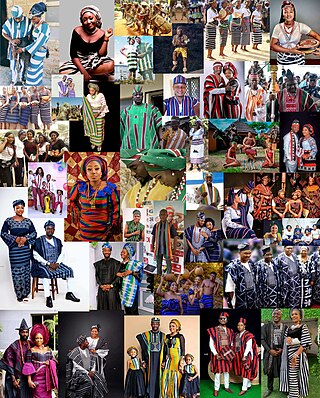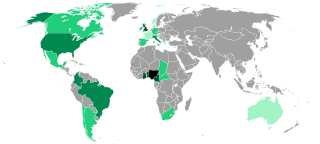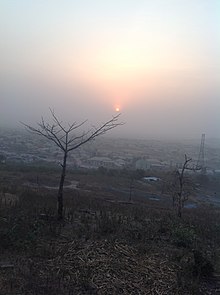
Nigeria, officially the Federal Republic of Nigeria, is a country in West Africa. It is situated between the Sahel to the north and the Gulf of Guinea to the south in the Atlantic Ocean. It covers an area of 923,769 square kilometres (356,669 sq mi). With a population of more than 230 million, it is the most populous country in Africa, and the world's sixth-most populous country. Nigeria borders Niger in the north, Chad in the northeast, Cameroon in the east, and Benin in the west. Nigeria is a federal republic comprising 36 states and the Federal Capital Territory, where its capital, Abuja, is located. The largest city in Nigeria is Lagos, one of the largest metropolitan areas in the world and the largest in Africa.

The Igbo people are an ethnic group in Nigeria. They are primarily found in Abia, Anambra, Ebonyi, Enugu, and Imo States. Ethnic Igbo populations are found in Cameroon, Gabon, and Equatorial Guinea, as migrants as well as outside Africa. There has been much speculation about the origins of the Igbo people, which are largely unknown. The Igbo people are one of the largest ethnic groups in Africa.

Ifẹ̀ is an ancient Yoruba city in south-western Nigeria founded sometime between the years 500 BC-1000 BC. By 900AD, the city had become an important West African emporium producing sophisticated art forms. The city is located in present-day Osun State. Ifẹ̀ is about 218 kilometers northeast of Lagos with a population of over 500,000 people, which is the highest in Osun State according to population census of 2006.

Lokoja is a north-central city in Nigeria. It lies at the confluence of the Niger and Benue rivers and is the capital city of Kogi State. While the Bassa Nge, Yoruba (Oworo) and Nupe are indigenous to the area, other ethnic groups, including the Kupa-Nupe, Hausa, Ebira, Igala, Igbo, Bini/Edo, and Tiv have recently established themselves. Lokoja is projected to be the third fastest growing city on the African continent between 2020 and 2025, with a 5.93% growth rate. It was listed as a second class township by the 1917 township ordinance of the colonial administration, indicating that Lokoja is an old city.

The culture of Nigeria is shaped by Nigeria's multiple ethnic groups. The country has 527 languages, seven of which are extinct. Nigeria also has over 1,150 dialects and ethnic groups. The three largest ethnic groups are the Hausas that are predominantly in the north, the Yorubas who predominate in the southwest, and the Igbos in the southeast. There are many other ethnic groups with sizeable populations across the different parts of the country. The Kanuri people are located in the northeast part of Nigeria, the Tiv people are in the north central, and the Efik-Ibibio are in the south South. The Bini people are most frequent in the region between Yorubaland and Igboland.

Nnewi is a commercial and industrial city in Anambra State, southeastern Nigeria. It is the second largest city in Anambra state after Onitsha. Nnewi as a metropolitan area has two local government area, which are Nnewi North and Nnewi South, all centred around the Nnewi town. Even Ekwusigo local government area is now part of Nnewi urban area, as urbanization continues to spread from Nnewi to neighbouring communities. The Nnewi town which is the only town in Nnewi North, comprises four villages: Otolo, Uruagu, Umudim, and Nnewichi. Nnewi had been the centre of economics and commerce, being at a time the fastest growing industrial city east of the Niger, being the home of many industries such as The Ibeto Group, the Chicason Group, Cutix Cables, amongst others. The first indigenous car manufacturing plant in Nigeria is located in the city while the first wholly Made-in-Nigeria motorcycle, the 'NASENI M1' was manufactured in Nnewi.
Nigerian Americans are Americans who are of Nigerian ancestry. The number of Nigerian immigrants residing in the United States is rapidly growing, expanding from a small 1980 population of 25,000. The 2022 American Community Survey (ACS) estimated that 712,294 residents of the US were of Nigerian ancestry. The 2019 ACS further estimated that around 392,811 of these (85%) had been born in Nigeria. This puts the American-born Nigerian American population a little over 400,000. Similar to its status as the most populous country in Africa, Nigeria is also the African country with the most migrants to the US, as of 2013. In a study which was carried out by consumer genetics company 23andMe which involved the DNA of 50,281 people of African descent in the United States, Latin America, and Western Europe, it was revealed that Nigeria was the most common country of origin for testers from the United States, the French Caribbean, and the British Caribbean.

Christianity and Islam are the two main religions practiced in Nigeria The country is home to some of the world's largest Christian and Muslim populations, simultaneously. Reliable recent statistics do not exist; however, Nigeria is divided roughly in half between Muslims, who live mostly in the northern region, and Christians, who live mostly in the southern region of the country. Indigenous religions, such as those native to the Igbo and Yoruba ethnicities, have been declining for decades and being replaced by Christianity or Islam. The Christian share of Nigeria's population is also now on the decline, due to a lower fertility rate relative to the Muslim population in the country.
Nnewi South is a Local Government Area in Anambra South Senatorial Zone of Anambra State, Nigeria. Its population is approximately 1 million. Ukpor is the headquarters of Nnewi South.

The Middle Belt or Central Nigeria is a term used in human geography to designate a belt region stretching across central Nigeria longitudinally and forming a transition zone between Northern and Southern Nigeria. It is composed of the southern half of the defunct Northern Region of Nigeria, now comprising mostly the North Central and parts of the North East and North West geopolitical zones, and is characterised by its lack of a clear majority ethnic group. It is also the location of Nigeria's Federal Capital Territory.

The Hausa are a native ethnic group in West Africa. They speak the Hausa language, which is the second most spoken language after Arabic in the Afro-Asiatic language family. The Hausa are a culturally homogeneous people based primarily in the Sahelian and the sparse savanna areas of southern Niger and northern Nigeria respectively, numbering around 86 million people, with significant populations in Benin, Cameroon, Ivory Coast, Chad, Central African Republic, Togo, Ghana, as well as smaller populations in Sudan, Eritrea, Equatorial Guinea, Gabon, Senegal, Gambia. Predominantly Hausa-speaking communities are scattered throughout West Africa and on the traditional Hajj route north and east traversing the Sahara, with an especially large population in and around the town of Agadez. Other Hausa have also moved to large coastal cities in the region such as Lagos, Port Harcourt, Accra, Abidjan, Banjul and Cotonou as well as to parts of North Africa such as Libya over the course of the last 500 years. The Hausa traditionally live in small villages as well as in precolonial towns and cities where they grow crops, raise livestock including cattle as well as engage in trade, both local and long distance across Africa. They speak the Hausa language, an Afro-Asiatic language of the Chadic group. The Hausa aristocracy had historically developed an equestrian based culture. Still a status symbol of the traditional nobility in Hausa society, the horse still features in the Eid day celebrations, known as Ranar Sallah. Daura is the cultural center of the Hausa people. The town predates all the other major Hausa towns in tradition and culture.

Nigerians or the Nigerian people are citizens of Nigeria or people with ancestry from Nigeria. The name Nigeria was derived from the Niger River running through the country. This name was allegedly coined in the late 19th century by British journalist Flora Shaw, who later married Baron Frederick Lugard, a British colonial administrator. Nigeria is composed of various ethnic groups and cultures and the term Nigerian refers to a citizenship-based civic nationality. Nigerians are derived from over 250 ethno-linguistic groups. Though there are multiple ethnic groups in Nigeria, economic factors result in significant mobility of Nigerians of multiple ethnic and religious backgrounds to reside in territories in Nigeria that are outside their ethnic or religious background, resulting in the mixing of the various ethnic and religious groups, especially in Nigeria's cities. The English language is the lingua franca of Nigerians. Nigeria is divided roughly in half between Muslims, who live mostly in the north, and Christians, who live mostly in the south; indigenous religions, such as those native to the Igbo and Yoruba ethnicities, are in the minority.

Anti-Igbo sentiment encompasses a range of negative attitudes and feelings towards the Igbo people. The Igbo people make up a majority of the population in South East, Nigeria and part of the populations of the South South and the Middle Belt zones. Igbophobia can be observed in critical and hostile behaviour such as political and religious discrimination as well as violence towards Igbo people.
Akure Forest Reserve is a protected area in southwest Nigeria, covering 66 km2 (25 sq mi). The Akure Forest Reserve, established in 1948 and spanning approximately 32 hectares. It was created with the primary aim of safeguarding the genetic diversity of the forest ecosystem. About 11.73% (8.2 km2) is estimated to be cleared for cocoa farming and other food crops. Aponmu and Owena Yoruba speaking communities owned the forest, though, there are also minor settlements surrounding the forest. They include Ipogun, Kajola/ Aponmu, Kajola, Ago Petesi, Akika Camp, Owena Town, Ibutitan/Ilaro Camp, Elemo Igbara Oke Camp and Owena Water new Dam.
Ipetumodu () is a city in Osun State, in the southwestern part of Nigeria. It is the headquarters of the Ife North local government area. The city is under the leadership of traditional ruler with the title of Apetumodu, which means "one who killed an antelope for sacrificial purposes for Odu".
Omuo-Ekiti is an ancient town in the eastern part of Ekiti State in western Nigeria, and the seat of the Ekiti-East local government. Being inside Yorubaland, its population and that of Ekiti State are mainly the Yoruba It is located on the border of the state of Ondo.

Architecture of Nigeria was historically influenced by environmental conditions as well as social and cultural factors. The coming of missionaries and political changes brought about by colonialism precipitated a change in architectural style and utility of buildings. A Gothic revival style was adopted for early churches built in the colony of Lagos. A one or two-storey timber house building made with pre-fabricated material components and designed with the influence of classic antiquity styles served as mission house for the missionaries. Colonial residents working for the Public Works Department introduced a variant of neoclassical architecture to designs of government buildings and private residencies.
Mushin Olosha is a community within the Mushin Local Government Area of Lagos State, Nigeria. It is recognized for its vibrant markets, cultural heritage, and active economic life. The area is a hub of commercial activities and has a rich cultural tapestry, reflecting the diverse population that resides there.












